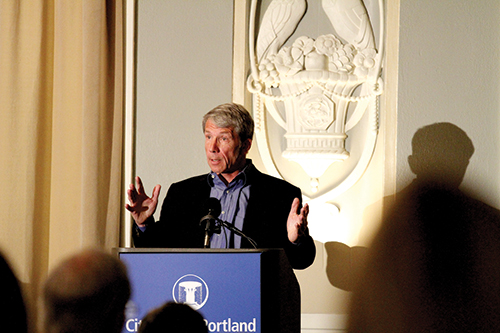Following the 2012 presidential election, questions were asked in Republican circles about the results of the election. How was President Barack Obama elected to a second term when Republicans were positive Mitt Romney would win?
Congressman Schrader calls for immigration reform

Following the 2012 presidential election, questions were asked in Republican circles about the results of the election.
How was President Barack Obama elected to a second term when Republicans were positive Mitt Romney would win?
A number of theories arose in the weeks following, but one was that harsh Republican rhetoric and policies regarding immigration had driven Hispanics to vote for Obama. Realizing that the Hispanic population is becoming a major part of the electorate, some Republican politicians have changed their tone and actions.
This Republican change of heart is what gave Oregon U.S. Rep. Kurt Schrader optimism for the future of immigration reform. Invited to speak by the City Club of Portland, Schrader lectured to a standing-room-only crowd at the Governor Hotel on Friday, and gave a bit of a history lesson to those attending.
Schrader reminded the crowd that the U.S. has seen numerous waves of immigration in its history, and with each major wave has suffered from anti-immigrant rhetoric and policy.
“History shows that the immigration policies reflected economics [and] prevailing social norms, and oftentimes the prejudices that we feel [toward] other people that just don’t happen to be like or look like us,” Schrader said.
Schrader’s most compelling example came from 1790 naturalization laws that allowed citizenship for free white people—“an early harbinger of how future immigration policies would reflect racial, social and ethnic prejudices,” he said.
Given the abysmal history of U.S. immigration policy, Schrader feels that reform is absolutely necessary.
This sentiment was echoed by Portland State professor of Chicano/Latino studies Roberto de Anda.
“The immigration system today can be summed up as a broken system. It’s a system that doesn’t work, either for those that need immigrant labor or for those seeking employment,” de Anda said.
De Anda gave his own history lesson, drawing a potential parallel between the Bracero Program of the 1940s and the guest worker program offered in the latest legislation proposal. In particular, he expressed surprise that labor unions and civil rights groups aren’t more concerned about the potential abuses that could arise from a guest worker program, as they did from the Bracero Program. Additionally, he said that guest worker programs do not work because employers use guest workers as a flexible workforce to break organized labor.
Schrader cited the changing opinions in some states as a harbinger for change in Congress. In particular, he cited Oregon laws allowing undocumented immigrants to get driver’s licenses and giving children of undocumented immigrants in-state tuition. These citations earned the congressman a round of applause from the crowd.
He went on to explain the importance of creating a federal solution to the issue of immigration reform, since the costs of immigration enforcement fall largely on the states. This is aside from the clear inefficiencies in the current immigration process. Referring to the system as “byzantine,” Schrader provided examples of constituents who had faced decades of waiting for approval of their citizenship.
Despite the congressman’s optimism about the future of immigration reform and long history of U.S. policy, he provided little detail about the specifics of what is currently being proposed in the legislation offered in the Senate. Schrader seemed to answer to this lack of detail when he stated that “we can’t let the perfect be the enemy of the necessary.”
Ultimately, de Anda provided the most universal reason for reforming immigration policies: “We cannot tolerate in a democracy…a group of legal residents who are barred from [becoming] citizens. We cannot allow this to happen.”




